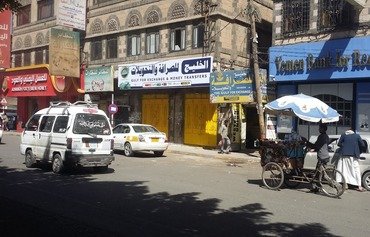The value of the Yemeni riyal continues to deteriorate amid an increase in demand on foreign currency, leading to a hike in oil derivatives and basic foods prices, experts told Al-Mashareq.
The exchange rate on Wednesday (November 1st) reached 250 Yemeni riyals against the US dollar.
The value of the riyal further deteriorated in the month of October because of seasonal increase in demand on hard currencies around this time of the year, National Bank chairman Mohammed Hassan Halbub said.
Furthermore, the Central Bank did not intervene to control the exchange rates by injecting hard currencies into the economy, he told Al-Mashareq.
"The demand on the [US] dollar usually increases in October because of the rising demand on oil derivatives, especially by farmers," he said, leading to a higher demand on hard currencies in order to import oil derivatives.
Another factor is the drop in expatriates’ remittances at this time of the year, which is also a seasonal factor, Halbub said.
Yemen's Central Bank used to intervene by injecting millions of dollars into the exchange market to meet the rising demand, he said.
"However, this did not happen this year because the Bank no longer has reserves, and the International Monetary Fund (IMF) has refused to give it a loan," he added.
The Houthi-held government in Sanaa has issued bad checks to buy the US dollar from the market and speculate in the funds to finance its activities, he said, noting that this has led to an increase in public debt to "more than five trillion riyals".
Taha al-Faseel, an economics professor at Sanaa University, told Al-Mashareq that the deterioration of the riyal compounds the suffering of the Yemeni people due to the rising prices of oil derivatives and basic foods.
"The continued rise in the value of hard currency against the riyal and the rates fluctuations may prompt importers to refrain from selling their goods," he said, warning that this state of affairs will exacerbate the country's humanitarian crisis.

![Yemenis buy sweets and nuts at a market in the capital Sanaa. The continued deterioration of the Yemeni riyal against foreign currencies threatens to undermine citizens' abilities, experts warn. [Mohammed Huwais/AFP]](/cnmi_am/images/2017/11/01/10209-Yemen-Sanaa-market-600_384.jpg)







These sayings and policies are from cheap mercenaries, sellers of homelands.
Reply2 Comment(s)
God willing, a breakthrough will come through so the good can be distinguished from the evil!
Reply2 Comment(s)